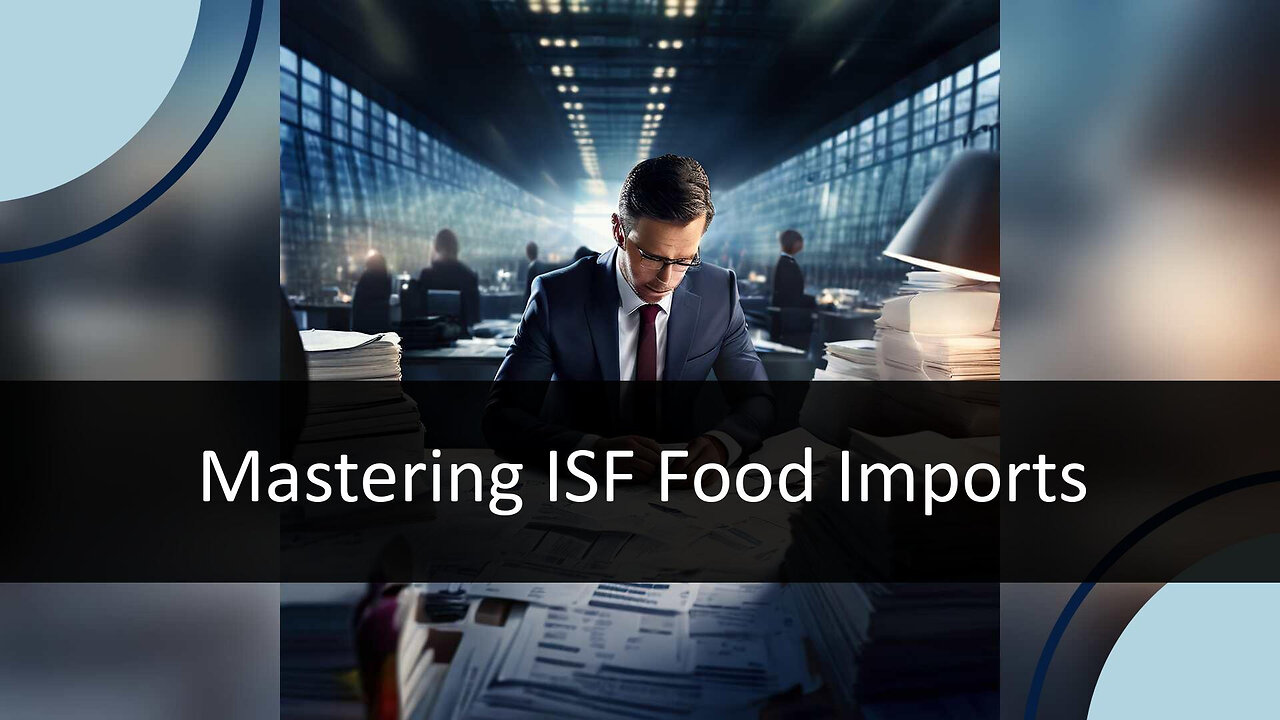Premium Only Content

Cracking the Code: ISF Documentation for Smooth Food Imports
ISF Solution | (832-904-9333)
[email protected] | www.isfsolution.com
In today's video, we deep dived into the topic of ISF documentation for food imports. Importing food products can be a complex process that requires careful attention to detail. Understanding the necessary documentation for food imports is crucial to ensure a smooth customs clearance process. One of the essential documents for food imports is the Importer Security Filing, or ISF.
The Importer Security Filing, also known as ISF, is a mandatory electronic filing requirement for all ocean shipments entering the United States. This filing must be completed by the importer or customs broker 24 hours before the cargo is loaded onto the vessel overseas. The ISF includes important information about the shipment, including details about the importer, consignee, manufacturer, shipper, and more. It is crucial to accurately and timely file the ISF to avoid any delays or penalties.
When it comes to food imports, specific elements need to be considered while completing the ISF documentation. These include the Food and Drug Administration (FDA) registration number, Prior Notice confirmation number, and the name of the FSVP (Food Safety Verification Program) agent. Providing these details in the ISF ensures that the customs authorities have the necessary information to verify the compliance of the imported food products with FDA regulations.
In addition to the ISF, there are other important documents required for food imports, such as the FDA Prior Notice and various certificates of origin, quality, and compliance. These documents are essential to demonstrate the safety and compliance of the food products being imported. Working with a knowledgeable customs broker who specializes in food imports can help ensure that all the necessary documentation is completed accurately and in a timely manner.
Another critical consideration for food imports is customs bonds. A customs bond is a financial guarantee that ensures compliance with customs regulations, including the payment of any duties, taxes, or penalties. Importers of food products are required to have a customs bond to meet the regulatory requirements. It is important to understand the different types of customs bonds available and choose the most appropriate one for your specific import requirements.
As an importer of food products, it is also vital to stay up to date with any changes or updates in the regulations governing food imports. The world of international trade is constantly evolving, and new regulations may be introduced from time to time. Continuous learning and staying informed about the latest developments in food import regulations will help you maintain compliance and prevent any disruptions in your supply chain.
In conclusion, having a solid understanding of the necessary documentation, such as the ISF and other required certificates, is crucial for a successful and compliant food import process. It is recommended to work with a knowledgeable customs broker who specializes in food imports to ensure accurate and timely completion of all necessary documentation. Staying informed about the latest developments in food import regulations is also essential to maintain compliance in this constantly evolving field. Thank you for joining us in today's video, and we look forward to providing more informative content on customs brokerage and international trade in the future.
#usimportbond
#isfcustomsbroker
#uscustomsclearing
#isfentry
Video Disclaimer Here: For educational purposes - No affiliation with US government sectors.
-
 1:21:21
1:21:21
Tucker Carlson
3 hours agoThe Global War on Christianity Just Got a Whole Lot Worse, and Ted Cruz Doesn’t Care
38.5K206 -
 10:50
10:50
Dr. Nick Zyrowski
2 days agoDoctors Got It Wrong! This LOWERS CORTISOL In Minutes!
12.3K3 -
 24:14
24:14
Verified Investing
2 days agoBiggest Trade As AI Bubble Begins To Burst, Bitcoin Flushes Through 100K And Gold Set To Fall
8.16K -
 1:12:28
1:12:28
Sean Unpaved
3 hours agoAB's Dubai Drama: Extradited & Exposed + NFL Week 10 Locks & CFB Week 11 Upsets
19.7K -
 2:06:08
2:06:08
The Culture War with Tim Pool
5 hours agoDemocrats Elect Man Who Wants To Kill Conservatives, Time For An Exorcism | The Culture War Podcast
121K100 -
 1:36:52
1:36:52
Steven Crowder
6 hours agoMamdani's Anti-White Victory Must Be America's Wake Up Call
314K364 -
 2:18:38
2:18:38
Side Scrollers Podcast
5 hours agoGTA 6 GETS WRECKED AFTER ANOTHER DELAY + India THREATENS YouTuber Over Video + More | Side Scrollers
25.6K6 -
 1:00:20
1:00:20
Simply Bitcoin
7 hours ago $0.08 earnedThe Bitcoin Crucible w/ Alex Stanczyk ft Tomer Strolight - Episode 7
39.4K1 -
 17:33
17:33
a12cat34dog
7 hours agoRUMBLE TAKEOVER @ DREAMHACK | VLOG | {HALLOWEEN 2025}
32.1K22 -
 LIVE
LIVE
Spartan
4 hours agoStellar Blade Hard Mode with death counter (First Playthrough)
33 watching